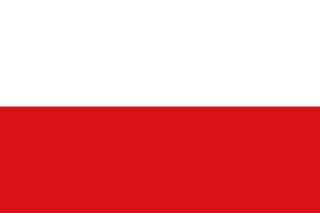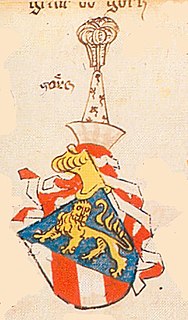
Meinhard II, a member of the House of Gorizia (Meinhardiner), ruled the County of Gorizia and the County of Tyrol together with his younger brother Albert from 1258. In 1271 they divided their heritage and Meinhard became sole ruler of Tyrol. In 1286 he was enfeoffed with the Duchy of Carinthia and the adjacent March of Carniola.

Albert I, a member of the House of Gorizia, ruled the counties of Gorizia (Görz) and Tyrol from 1258, jointly with his elder brother Meinhard IV. In 1271, the brothers divided their heritage and Albert became sole ruler of the Gorizia estates until his death. His descendants, known collectively as the Albertine line, ruled the County of Gorizia until the extinction of the House in 1500.

Meinhard I, a member of the House of Gorizia (Meinhardiner), was Count of Gorizia from 1231 and Count of Tyrol from 1253 until his death.
Meinhard III, a member of the House of Wittelsbach, was duke of Upper Bavaria and count of Tyrol from 1361 until his death. He was the son of Duke Louis V of Bavaria with Countess Margaret of Tyrol and as such also the last descendant of the Tyrolean branch of the House of Gorizia.

The (Princely) County of Tyrol was an estate of the Holy Roman Empire established about 1140. Originally a jurisdiction under the sovereignty of the Counts of Tyrol, it was inherited by the Counts of Gorizia in 1253 and finally fell to the Austrian House of Habsburg in 1363. In 1804 the Princely County of Tyrol, unified with the secularised prince-bishoprics of Trent and Brixen, became a crown land of the Austrian Empire in 1804 and from 1867 a Cisleithanian crown land of Austria-Hungary.

The County of Gorizia, from 1365 Princely County of Gorizia, was a State of the Holy Roman Empire. Originally mediate Vogts of the Patriarchs of Aquileia, the Counts of Gorizia (Meinhardiner) ruled over several fiefs in the area of Lienz and in the Friuli region of northeastern Italy with their residence at Gorizia (Görz).

The Counts of Gorizia, also known as the Meinhardiner, were a comital and ducal dynasty in the Holy Roman Empire. Named after Gorizia Castle in Gorizia, they were originally "advocates" (Vogts) in the Patriarchate of Aquileia who ruled the County of Gorizia (Görz) from the early 12th century until the year 1500. Staunch supporters of the Emperors against the papacy, they reached the height of their power in the aftermath of the battle of Marchfeld between the 1280s and 1310s, when they controlled most of contemporary Slovenia, western and south-western Austria and north-eastern Italy. After 1335, they began a steady decline until their territories shrunk back to the original County of Gorizia by the mid 1370s. Their remaining lands were inherited by the Habsburg ruler Maximilian I.
Engelbert II, a member of the House of Sponheim, was Margrave of Istria and Carniola from about 1103/07 until 1124. In 1123, he succeeded his elder brother Henry as Duke of Carinthia and Margrave of Verona which he held until his retirement in 1135.
Engelbert III, a member of the Rhenish Franconian House of Sponheim, was Margrave of Istria from 1124 until his death.

Berthold III, a member of the Bavarian House of Andechs, was Margrave of Istria from 1173 until his death.

The Counts of Ortenburg were a comital family in the mediaeval Duchy of Carinthia. Though they had roots in Bavarian nobility, an affiliation with the Imperial Counts of Ortenburg, a branch line of the Rhenish Franconian House of Sponheim, is not established.

Meinhard VI of Gorizia a member of the Meinhardiner dynasty, an imperial prince and a count of Gorizia.

Albert II, a member of the House of Gorizia, ruled as governor of the County of Gorizia from 1323, on behalf of his nephew Count John Henry IV. He inherited from his father only the lands in the Puster Valley.

Albert III, a member of the House of Gorizia, ruled as Count of Gorizia from 1338 until his death.

Henry VI (1376–1454), a member of the House of Gorizia, ruled as Count of Gorizia from 1385 until his death. He was also Count Palatine of Carinthia, governor of Belluno-Feltre and Landeshauptmann of Carniola. Through his first marriage with Elizabeth of Cilli, he was the brother-in-law of Sigismund of Luxembourg, Holy Roman Emperor and King of Hungary.
Henry I was Count of Tyrol from 1180 until his death.

Matilda of Andechs was a daughter of Margrave Berthold I of Istria and his first wife, Hedwig of Dachau-Wittelsbach, daughter of the Bavarian Count palatine Otto IV of Scheyern.

Engelbert II, a member of the House of Gorizia, was Count of Gorizia (Görz) from 1150 until his death. At the end of his life, he also held the title of a Margrave of Istria, a Count palatine in the Duchy of Carinthia and Vogt (Reeve) of the Patriarchate of Aquileia.

Meinhard II, nicknamed the Elder, a member of the House of Gorizia (Meinhardiner), was ruling Count of Gorizia from 1220 until his death. He also held the title of Vogt (Reeve) of the Patriarchate of Aquileia.

Meinhard I, an ancestor of the noble House of Gorizia, was ruling count of Gorizia from 1122 until his death. He also held the offices of a Count palatine in the Duchy of Carinthia as well as Vogt governor of the Patriarchate of Aquileia and of St Peter Abbey in the March of Istria.










